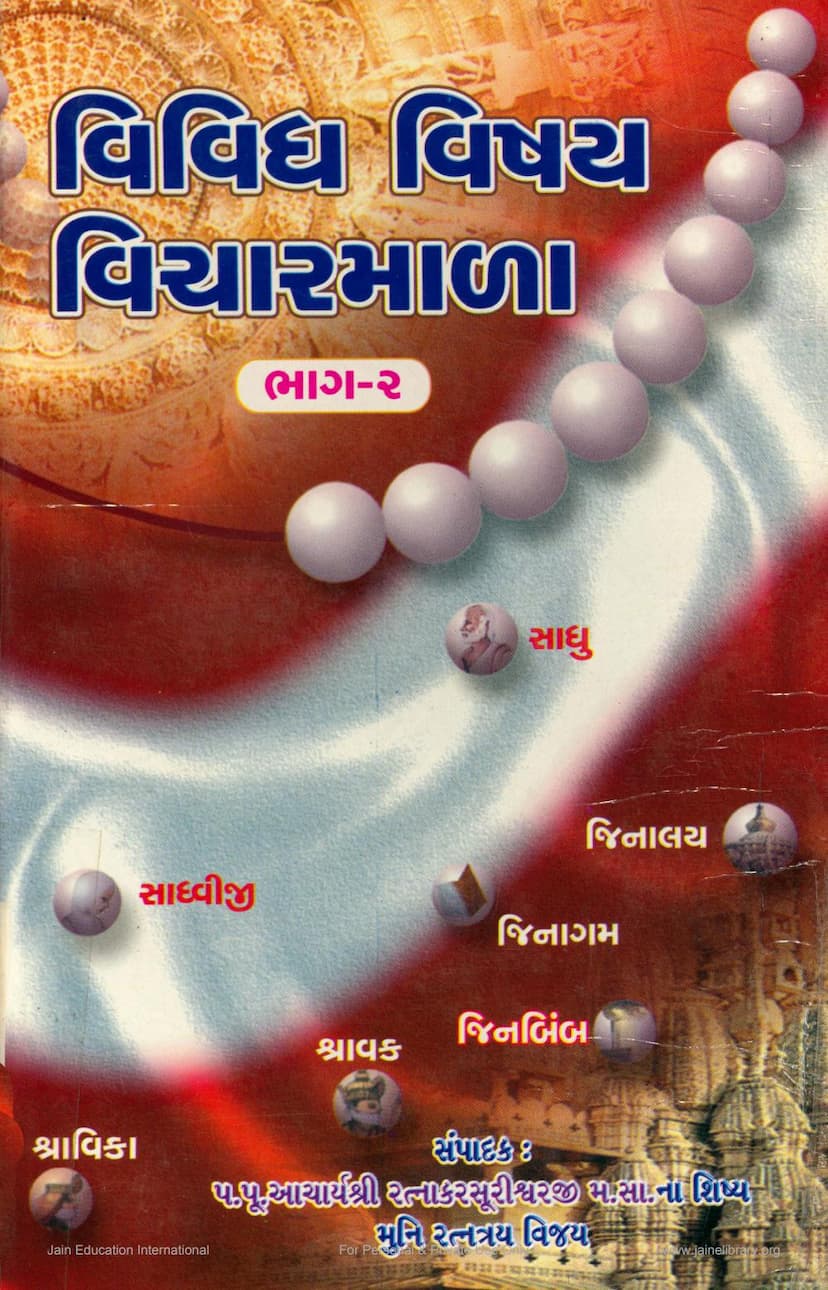Vividh Vishay Vicharmala Part 02
Added to library: September 2, 2025

Summary
Here's a comprehensive summary of "Vividh Vishay Vicharmala Part 02" based on the provided text:
Book Title: Vividh Vishay Vicharmala Part 02 (Various Subjects - Thought Series, Part 02) Author: Ratnatrayvijay (Editor/Compiler), Munishri Manivijayji M.S. (Original Editor) Publisher: Ranjanvijay Jain Pustakalay, Malwada, Dist. Jalore, Rajasthan.
Overall Purpose and Content:
"Vividh Vishay Vicharmala" is a multi-part series (published in 8 parts) aimed at disseminating Jain principles and teachings in an accessible and engaging manner. Part 02, like the others, is a collection of various topics relevant to Jainism, presented with illustrative stories and explanations. The series aims to be a valuable resource for monks, nuns, and lay followers (Shravaks and Shravikas) alike, providing deep insights into Jain philosophy and practice. The re-editing and re-publication of this series address its unavailability for the past 40 years.
Key Themes and Topics Covered in Part 02 (and alluded to in the overall series):
- The Ideal Shravak (Lay Follower): A significant portion of this volume is dedicated to defining the characteristics and duties of an ideal Shravak according to Jain scriptures. This includes:
- Core Qualities: Faith in the Jina's teachings, devotion to the path, giving alms to the deserving, adherence to right faith, practice of restraint, control of senses, and effort towards discipline.
- Essential Practices: Devotion to Jinendra, Guru's worship, self-study (Swadhyaya), asceticism (Sanyam), austerity (Tapas), and charity (Dan).
- Character Traits: Honesty, truthfulness, purity, compassion, humility, absence of greed, contentment, renunciation of negative traits like anger and ego, and adherence to ethical conduct.
- Distinction from Nominal Followers: The text emphasizes that being a "named" Shravak is not enough; one must embody the true qualities described in the scriptures.
- Types of Shravaks: The text outlines different classifications of Shravaks, including those who are like parents, brothers, friends, and rivals to the spiritual path, and also those who are like mirrors, flags, pillars, or thorns.
- Daily Conduct: The importance of prescribed daily rituals and practices is highlighted.
- Ethical Conduct and Virtues: The book delves into various virtues and their importance in daily life, including:
- Behavioral Purity (Vyavahar Shuddhi): Emphasized through stories, illustrating the importance of honesty and integrity in dealings.
- Dharma (Righteousness): The core of Jainism, presented as the path to liberation and well-being.
- Moral Values: Emphasis on truth, non-violence, restraint, and the rejection of vices.
- Rituals and Practices:
- Samayik: Detailed explanation of its meaning (equanimity, absence of sin) and its significance, including the concept that even a short period of Samayik is more valuable than extensive material donations. The text also lists 32 common faults to avoid during Samayik.
- Pratikraman: Explained as a process of turning back from past mistakes and performing introspection. The correct timings for Pratikraman are discussed, with a critique of modern deviations. The benefits of performing Pratikraman are highlighted through various examples.
- Paushadh: The importance of observing this fortnightly fast and its associated virtues is discussed. The text lists 18 faults to avoid during Paushadh.
- Deva Puja (Worship of Deities): The significance and various aspects of worship are touched upon.
- Scriptural Insights and Moral Teachings:
- Stories and Parables: The book is rich with narratives that illustrate Jain principles, ethical dilemmas, and the consequences of actions. These stories often feature kings, merchants, and individuals facing moral choices.
- Aphorisms and Sayings (Suvakya): A large collection of moral and ethical sayings are presented, offering guidance on various aspects of life, from personal conduct to societal interactions. These are categorized as "Naitik Bodh Vachano" (Ethical Enlightenment Verses).
- The Rarity of Human Birth: The text repeatedly emphasizes the preciousness and difficulty of obtaining a human birth, comparing its attainability to seemingly impossible tasks.
- The Importance of Dharma: Dharma is presented as the ultimate refuge and the key to a meaningful life and ultimate liberation.
- The Dangers of Misconduct: The book details the severe repercussions of unethical actions, such as stealing, lying, anger, greed, and disrespect towards spiritual figures.
- The Value of Spiritual Practices: The importance of practices like meditation, self-study, and devotion is consistently highlighted as the path to inner peace and salvation.
- Specific Concepts Discussed:
- Devadravya (Wealth belonging to Deities/Temples): The text elaborates on who is qualified to manage temple wealth and the severe consequences of misusing or misappropriating it, drawing parallels to severe punishments for such actions.
- Jnana Dravya and Sadharan Dravya (Knowledge and Common Wealth): The importance of safeguarding these assets and the negative consequences of their misuse are explained through cautionary tales.
- Upadhan: The concept of a specific form of austerity.
- Vividh Vishay Vicharmala Series: The preface and the table of contents suggest that the entire series covers a vast range of Jain topics, from the nature of deities, gurus, and dharma to specific practices, ethical codes, and philosophical concepts. Part 02 seems to focus heavily on the Shravak's role and daily conduct.
Key Takeaways:
"Vividh Vishay Vicharmala Part 02" serves as a guide to living a righteous Jain life. It emphasizes the importance of ethical conduct, diligent practice of rituals, self-reflection, and unwavering faith in the Jain principles. The stories and teachings aim to inspire readers to cultivate virtues, overcome vices, and ultimately strive for spiritual upliftment and liberation. The re-publication of this work aims to reintroduce these valuable teachings to a modern audience.